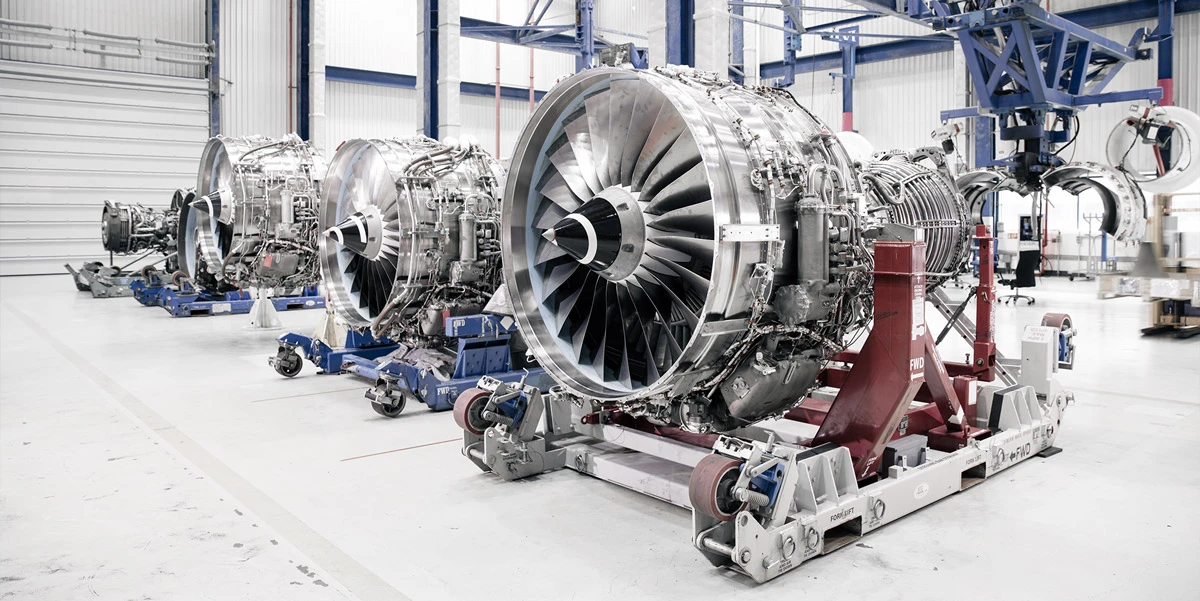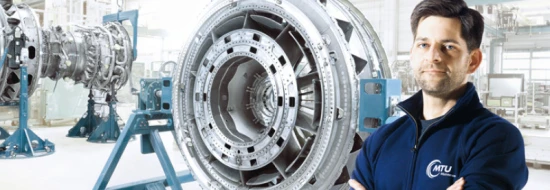aviation
How airlines benefit from engine leasing
Leasing is a smart option for engine management. Airlines save the purchase cost, increase their flexibility, and access an alternative to maintenance.
author: Nicole Geffert | 6 mins reading time published on: 15.02.2024
author:
Nicole Geffert
has been working as a freelance journalist covering topics such as research and science, money and taxes, and education and careers since 1999.





Engine leasing: Engine leasing is a form of financing in which an engine owner makes an engine available to an aircraft oper-ator, for example an airline, for a certain period of time and at an agreed price. The airline saves the cost of purchasing the engine, minimizes downtime, and remains flexible.
In 2023, more than 50 percent of all passenger and cargo aircraft in service worldwide were leased. By comparison, that figure was just under 25 percent in 2000. The trend toward leasing engines is also increasing—and with it the demand for flexible solutions.
“Engine leasing does more than provide airlines with replacement engines so they can continue to operate their fleets during shop visits,” says Patrick Biebel, Managing Director at MTU Maintenance Lease Services. “It also gives them the advantage of not having to invest capital in buying engines.” All this affords the airlines flexibility when responding to market demand and minimizes the risk of depreciation and overcapacity.
“We provide flexible engine leasing solutions to offer airlines exactly what they want without their having to pay for services they don’t need,” says Alistair Forbes, Senior Market Analyst at MTU Maintenance Lease Services. Based in Amsterdam, this company is the leasing and asset management arm of MTU Maintenance. For the past ten years, it has been providing tailored services to airlines and engine owners. The company also gives airlines the option of taking any engines currently not in use into its leasing pool so it can then market these engines to other airlines at short notice. “We can either buy the engine or lease it from the airline, depending on their long-term plan for the asset. Either way it boosts the airlines’ liquidity and gives us the opportunity to further expand our pool, which is now over 100 engines,” Forbes says.

Lease engines: Lease engines are engines that are rented instead of purchased for a certain period of time and at an agreed price.
Lessors and MRO experts
Engines are attractive assets that appeal to investors. Finance companies have been players in the leasing business for a long time now. But MTU Maintenance has a crucial advantage: because the company specializes in maintenance, repair, and overhaul (MRO), it has many years of experience and expertise in this field. MTU experts can be trusted to reliably assess the technical condition of an engine and its components. They know when it’s worth making repairs on a given engine and when it would be more cost-effective to lease a different one. Plus, they can gauge whether leasing is still the customer’s best option or whether this might be the right time to tear an engine down into individual parts or modules that can then be reused. “Our MRO expertise allows us to acquire assets that would make little sense for other lessors, especially banks,” Forbes says.

Short-term leasing: Short-term leasing of engines usually covers a period of a few months to a maximum of three years. Short-term leasing is ideal if a replacement engine is required for the duration of a store visit.
MTU Maintenance Lease Services focuses on short-term leases that run anywhere from three months to two years. “The demand for short-term leasing is growing all the time. Now that the aviation industry has recovered from the effects of the pandemic, business is booming for many airlines and lessors but capacity in MRO shops remains extremely limited,” Biebel says. Leasing can also be a viable alternative to maintenance, especially when it’s cheaper for the airline to lease an engine rather than have their old one repaired. The biggest cost driver for a shop visit is the materials, which really takes a bite out of the budget, even for older generations of engines. “MRO activities tend to die down when an engine is about to be decommissioned,” Forbes says. It’s not uncommon for airlines with older fleets to realize that it’s no longer worth making large-scale repairs to their engines.

Global team: More than 70 experts in Amsterdam, Dublin and Singapore form the core of MTU Asset Management Services, supported by cutting-edge tools developed in-house.

Green-time engines: Green-time engines are engines that have a certain remaining service life before they have to go into the shop for maintenance. By leasing green-time engines, airlines and lessors can avoid or postpone extensive repairs to their own, often older engines and thus save costs.

Asset management is a service that aims to maximize the value of an engine for the benefit of the owner. The services range from evaluating the engine and analyzing its residual value, purchasing or leasing the entire engine to comprehensive parts management. This includes dismantling the engine, repairing parts that can still be used, storing and recycling spare engine parts and selling parts that are not required.
Optimizing the remaining service life
Which solution is the most economical depends not just on the condition of the engine but also on its remaining service life. If the engine needs to fly reliably for several more years, repairs can be the best solution. This is where MTU Maintenance comes in. The company expertly performs efficient repairs on older engines using certified used parts with a remaining service life that matches the customer’s requirements. “If it’s not worth it for the operator to commission a repair, we can provide them with a ‘green-time engine’—one that is cost-effective to buy or lease and whose remaining service life is tailored to their requirements,” Forbes says. “Especially when an engine is reaching the end of its service life, owners want to maximize the profits from their asset.”
In such situations, the asset management arm of MTU Maintenance Lease Services optimizes the engine’s value to the customer’s benefit.
Let’s say that an airline owns several older engines and sends these to the MTU Maintenance shop. A team of experts there determines which of the engines are suitable for repair and which will be dismantled entirely. Components taken from the dismantled engines are then reconditioned and become part of those engines that are being repaired. In such cases, the airline becomes its own materials supplier—a solution that cuts costs dramatically.
“The essence of asset management is really about coming up with tailored services that meet the various different customer requirements,” Forbes says. There are also solutions for those components recovered from a teardown but not immediately rehomed in another engine: MTU Maintenance Lease Services sells these used components on behalf of the owner.
As a spare parts dealer, the company also deals in materials and individual parts that are fed into MTU’s global MRO network. “Today, asset management accounts for more than half of MTU Maintenance Lease Services business,” Forbes says. Also in demand are technical asset management services (TAMS).

Technical Asset Management: TAMS is the abbreviation for Technical Asset Management. This service supports airlines and lessors in managing their engine fleets. The services include defining the scope of service, planning and managing store visits, replacing engines and supporting the return of leased engines and checking engine documents.
The TAMS team advises airlines on topics such fleet planning. Forbes: “Our expert teams can make recommendations as to what has to be done to an engine before it is returned to the lessor. Aircraft leasing contracts usually contain clauses on the minimum service life of the engine, for example 2,000 cycles (take-offs and landings). Sometimes the airline’s planned flying would mean the engine would not have enough life remaining when the aircraft is returned and the airline would have to pay penalties to the lessor. This is where a leased spare engine can help. It can be used from when the aircraft engine reaches the minimum life condition until the end of the lease and is then replaced with the original engine. Although this involves the cost of two engine changes and a leased spare engine, it avoids the cost of an expensive shop visit or penalty charges. To be able to provide this kind of expert technical and legal contract knowledge is particularly helpful for airlines that don’t have experts in all necessary areas in house.

Engine leasing: MTU Maintenance offers a wide range of leasing services: no matter whether the customers need swift support in an AOG situation or are looking to lease during the term of a shop visit, the services are tailored to the customer's specific requirements.

Teardown: Teardown means that an engine is disassembled into its individual parts in order to inspect and evaluate them. Teardown can take place during maintenance, after a certain number of flight hours, or at the end of an engine's service life.
Spare parts are highly sought-after
Decommissioned engines are a veritable treasure trove of spare parts for maintenance procedures or for assembling green-time engines. “During the pandemic, surprisingly few aircraft were decommissioned,” says Marko Niffka, Director MRO Business Development at MTU Aero Engines. “Contrary to expectations, airlines continued to operate their existing fleets due to delays in the delivery of new aircraft. This meant that older engines remained in service longer and thus couldn’t serve as a source of spare parts.”
Prior to the pandemic, some 160 widebody aircraft were decommissioned every year. In 2021, that number dropped to 104 and in 2022 to 97. Although decommission rates are now rising again, the effects of this dip are still being felt throughout the industry. There is a particular shortfall in spare parts and used materials for popular older engine models such as the GE90-115, which powers the Boeing 777, and the CF6-80C2, which powers the Boeing 767 and others.
Nevertheless, MTU Maintenance managed to procure engines to dismantle, for instance by establishing a partnership with Aircraft End-of-Life Solutions (AELS), a Netherlands company that dismantles decommissioned aircraft. Together, the two companies purchased a decommissioned aircraft, complete with engines, from Virgin Australia. While AELS got to work on the airframe, MTU’s expert teams dismantled the engines to harvest their valuable parts. Biebel: “Such partnerships allow MTU Maintenance to tap new markets because when airlines decommission an aircraft, they usually want to sell the whole thing and not just the engines.” And MTU customers benefit from this supply of highly sought-after spare parts.
You may also be interested in following content

MTU Maintenance Lease Services
The site is MTU Maintenance’s main hub for ON-SITEPlus services in North America.
MTU Maintenance Lease Services B.V.
Based in Amsterdam, MTU Maintenance Lease Services B.V. is the leasing and asset management arm of MTU Maintenance. The team has many years of experience in the MRO business and offers airlines and lessors comprehensive solutions for every stage of an engine’s lifecycle. The company’s core business is in short-term engine leasing and cost-effective asset management, including technical consulting.
MTU Maintenance Lease Services provides these consulting services as part of its technical asset management services (TAMS). It also manages entire engine fleets, schedules shop visits, and provides engine owners with logistical support for their assets through transport and storage solutions.
More than 70 experts working in Amsterdam, Dublin, and Singapore with cutting-edge tools developed in-house form the backbone of MTU’s asset management services.








